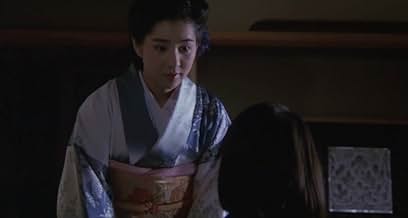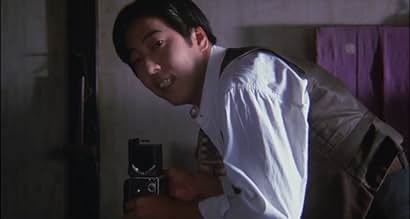IMDb-BEWERTUNG
7,2/10
1851
IHRE BEWERTUNG
Füge eine Handlung in deiner Sprache hinzuThe orphaned Makioka sisters look for a husband for their third sister, Yukiko, as the rebellious youngest sister, Taeko, is kept waiting her turn.The orphaned Makioka sisters look for a husband for their third sister, Yukiko, as the rebellious youngest sister, Taeko, is kept waiting her turn.The orphaned Makioka sisters look for a husband for their third sister, Yukiko, as the rebellious youngest sister, Taeko, is kept waiting her turn.
- Auszeichnungen
- 5 Gewinne & 9 Nominierungen insgesamt
Yonedanji Katsura
- Okuhata
- (as Kobeichô Katsura)
Michino Yokoyama
- Itani
- (as Michiyo Yokoyama)
Empfohlene Bewertungen
I give this film 10 out of 10 as even after seeing it more than 10 times it still moves me deeply. I was 15 years old when I first saw this movie in the theater in Seattle. I went back to see it again a couple of weeks later. The first 13 minutes during the credits is my favorite scene, filmed in Kyoto in Springtime. Read the book for more background. The Kimono worn by the female actresses are amazing. The late Juzo Itami plays the father. All the dialog is spoken in "Osaka-ben" or Osaka dialect, which has a softer sound than Tokyo dialect. You can also hear some Kyoto-ben too ("gomen-yasu" said by a servant upon entering in the first scene before entering the room). This film brings me to tears it is so beautiful. At the end of the first scene, when the camera pans out to the cherry blossoms outside and the music starts...it is cinematic heaven! I am waiting for this film to come out on DVD.
One should first read The Makioka Sisters by Junichiro Tanizaki to better understand this film. It is a very great novel about the life of four middle-class sisters in Osaka, Japan in the 1930's. The book describes in great detail the many subtleties of life in Japan which a Westerner can miss understanding in the film. The film rather closely follows the book and is very beautifully photographed.
"Each sister is engaged in their own affairs, but Ichikawa's film (its Japanese title can be literally translated as "light snow") allots the lion's share to Sachiko and Yukiko, and the matchmaking arrangement preceded by precise calculation of all the conceivable conditions ("background" should be investigated through and through, no mentally disturbed mother-in-law lurking in the dark), the sheer canniness and the business-like action is astounding (death certificates of diseased wife and children are tossed over the dinner table), and Yukiko, played by beloved Japanese actress Yoshinaga with a comely reticence, extraordinarily wears down the mounting pressure and grinding process, to claim her hard-won victory, a good match is worth the wait, especially when eligible ones are few and far between during the wartime; whereas Sakuma, so adroitly embodies Sachiko's diligence and tenuous discomposure under a painstakingly maintained graciousness that comes naturally with age and savoir faire."
read my full review on my blog: cinema omnivore, thanks
read my full review on my blog: cinema omnivore, thanks
The Makioka Sisters shows Ichikawa going back to one of the greatest 20th Century Japanese writers, Junichiro Tanizaki. Ichikawa had already directed, in the 1950s, a stunning adaptation of the Tanizaki novel The Key. The Key is an elliptical comedy about erotic fixation, with a lush visual style of saturated colors. The Makioka Sisters is a more subtle and delicate film, attuned as the novel was to the undercurrents running through the highly structured lives of the main characters. In some ways, the novel was Tanizaki's attempt to write a modern version of Murasaki Shikibu's Tale of Genji, and Ichikawa seems to have understood this in his adaptation, which brings a great deal of low-key humor and psychological insight to the proceedings, all very much in the Genji style. Essential viewing.
We saw this beautiful movie several years ago at a Pacific Film Archive showing. We had read the book and found the film followed it faithfully and was gorgeously photographed. We just wish we knew if and when it will ever be made available on DVD or videotape. It was a pleasure to see a film that depicts life in nearly modern Japan with realistic people and locations. We have seen so many "studied" and arty films or medieval Japan that this one has remained a favorite ever since. We were pleased when a beautiful copy of "The Leopard" was released last year and hope that something this classic and beautiful can be made available to viewers.
Wusstest du schon
- WissenswertesThe story spans the period from autumn, 1936, to April, 1941, ending about seven months before the Japanese attack on Pearl Harbor. The novel references a number of contemporary events, such as the Kobe flood of 1938, the Second Sino-Japanese War, and the growing tensions in Europe.
- PatzerTaeko is clearly wearing a strapless bra when she's in the bathtub.
- VerbindungenReferenced in Every Day a Good Day (2018)
Top-Auswahl
Melde dich zum Bewerten an und greife auf die Watchlist für personalisierte Empfehlungen zu.
Details
Zu dieser Seite beitragen
Bearbeitung vorschlagen oder fehlenden Inhalt hinzufügen

















